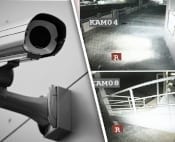The Walls Have Eyes with Hidden Spy Cameras
The technology of snooping devices such as spy cameras are constantly evolving, as targets range from terrorists and organised criminals to errant husbands.
As privacy watchdogs foresee a climate of suspicion intensifying in the near future, the debate over the levels of surveillance has never been so intense. Spy cameras may be used to catch criminals or monitor anti-social behaviour, but in the UK we are the most watched people in Europe.
The surveillance society
If you’ve seen the futuristic film Minority Report, you might recall the scene where Tom Cruise enters a shopping centre and has his profile scanned – adverts than appear targeting him directly based on his past purchases. But as well as this kind of surveillance technology clocking our every move, electronic tags are now embedded in purchases, so there is now the technology to build our purchasing profile and predict what other products we’ll buy. Some experts believe this sci-fi fiction could be a reality in just ten years. As spy cameras are now being adapted to ‘talk’ to offenders it captures on screen in an attempt to get them to pick up their litter (or whatever the crime may be) some watchdogs are worried that Britain is becoming an intensive surveillance society.
Surveillance is now everywhere
Technology is already used to trace everyday movements and surveillance cameras are everywhere – shops, streets and even in our workplaces. Although such pervasive surveillance can be good to try and reduce anti-social behaviour and is clearly good news for commerce, it is still considered to be a sinister Big Brother intrusion by some.
Secret cameras monitor our every move
Another potential scenario is if pay-as-you-drive regulations are bought in to ease the congestion problem – it could involve thousands of discreet cameras monitoring our journeys, and even spy planes continue to relay images to the police.
Who’s watching you?

But already many of us are unaware of the extent of spy equipment in use – we can be watched without even realising it. One thing is for sure, as levels of surveillance increase, debate will also intensify about how far the British public are willing to have their every move monitored.
As many argue that we need more CCTV and increased surveillance to fight terrorism, excessive surveillance could be counteractive and create an atmosphere of suspicion.
The Surveillance Studies Network group fears the future could:
- See employees being subjected to biometric tests to see how fit they are. If you’ve seen the sci-fi movie Gattaca you’ll know how discriminatory such tests can become.
- Schools could install cashless card systems for parents to pay for school dinners and the council can use this to see how healthily children are eating but such systems could store other information such as exam results or even internet use.
- The elderly could become increasingly isolated as relatives use spy cameras and sensors to monitor their welfare instead of visiting them.
